![[:fr]Les plus belles plages de Zanzibar[:en]Zanzibar best beaches[:]](https://lebigtriptravel.com/wp-content/uploads/2017/09/tanzania-beach.jpg)
7 reasons to add Zanzibar to your bucket list
For most of us, simply hearing the name Zanzibar brings up scents of spices, glimpses of a rich history, and pictures of paradisiac beaches. And whether you want to relax after your Tanzanian safari, recover from a long overseas flight, or discover new places and fragrances, Zanzibar is the place to be.
So if you’ve already booked your flight ticket, or still wondering if you should, here’re the top reasons why Zanzibar must make it to your bucket list.
A bit of context
Zanzibar is composed of multiple small islands and 2 big ones: Unguja (the main island) and Pemba island. For many years, it has been a base for merchants travelling between the African Great Lakes, the Arabian peninsula, and the Indian subcontinent. It has a very rich history being in turn ruled by the Arabs, the Portuguese, and the British before getting its independence in 1963. A history of flamboyant sultans as well as a darker side when the island played a major role in the slave trade.
Zanzibar holds a very important place in Tanzania. So much that the name Tanzania comes from Tanganyika (Swahili for “sail in the wilderness”) and Zanzibar, from the time the 2 states unified to form the country. Interestingly, Tanzania still has 2 governments and Tanzanians elect one president for the United Republic of Tanzania and the president of Zanzibar on the same day!
1. Soak up history and culture in Stone Town
Stone town is the old part of Zanzibar City, the main city of Zanzibar. It is a Unesco World Heritage Site, and when you stroll in its narrow streets, you quickly understand why.
The best way to get the most out of your tour is definitely to hire a guide. They will bring you in the best spots, tell you secrets about the history, so all you have to do is to follow them and enjoy Stone Town’s wonders. To give you an idea, here’s what we’ve been up to with Musa, our guide from Eco & Culture Tours Zanzibar:
Zanzibar cultural mix
Start your tour simply waking in the narrow streets. Every few hundred meters, you’re likely to find a mosque. Unlike the rest of Tanzania, Zanzibar, is 98.9% muslim and holds about 50 mosques. Rich merchants at the time would build their own for the community as well as their convenience. What’s interesting is that you’ll also find 2 cathedrals and 4 hindu temples and everyone lives in harmony. It’s not a surprise when you discover how welcoming and open Zanzibaris are.
Zanzibar doors
Another thing that you’ll find at every street corner is the Zanzibar elaborately carved wooden doors, mixing Swahili, Arabic and Indian cultures. Arab doors often include verses of the Koran, while Indian doors showcase Brass studs that were used in rural India to prevent elephant attacks. Some of the doors mix Arab and Indian influences. Each one is unique and tells stories of the residents’ social status, religion, and profession. Even nowaday, Zanzibaris save for years in order to afford one of those beauties.
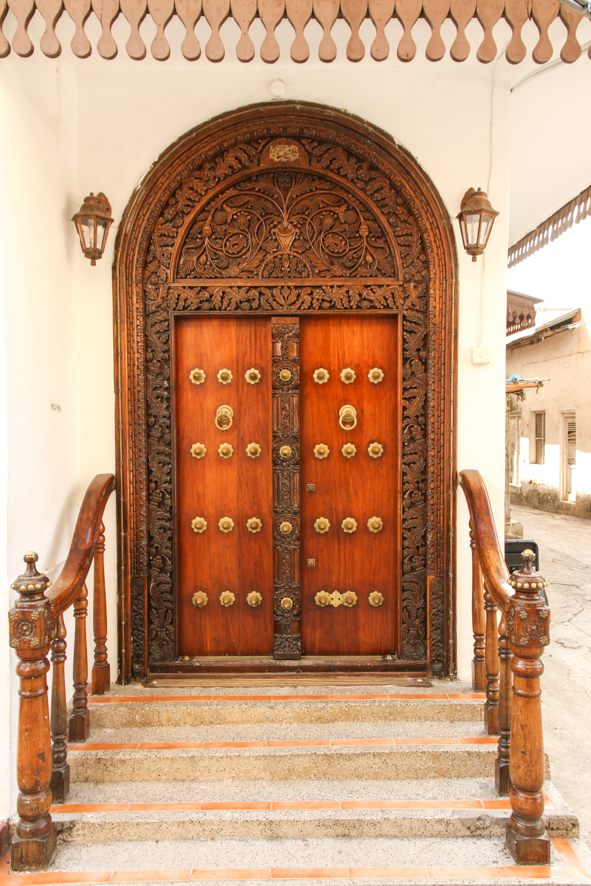
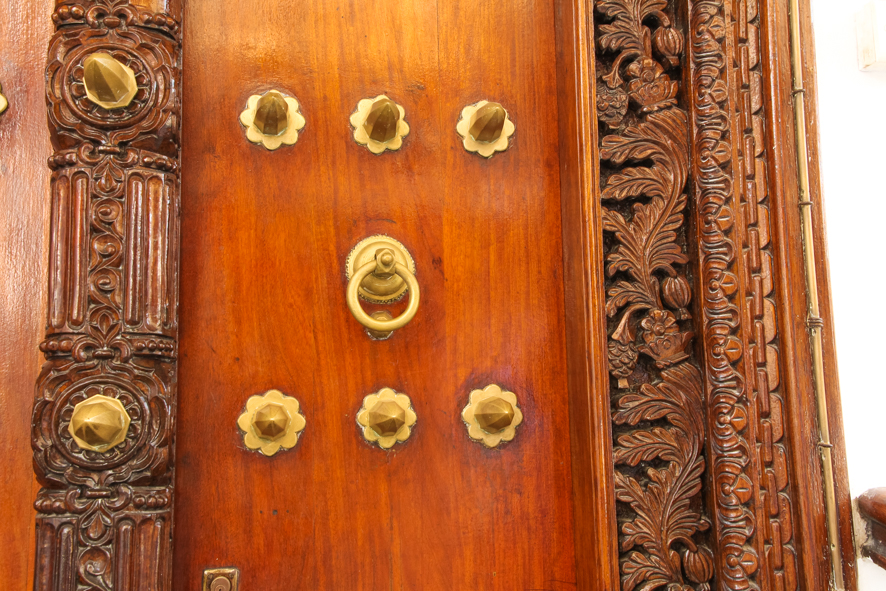
The markets
Eventually, you’ll end up at the markets. We love markets. Everywhere in the world, they’re bustling with life. People screaming, haggling, talking, sleeping… A great place for genuine photography. In Zanzibar, I found the chicken corner and the fish market especially interesting. And don’t forget to watch out for pickpockets.
East African Slave Trade Exhibit
When you go, don’t miss the museum on the history of slavery and the former slave market. In the 19th century, Zanzibar was a cornerstone of the slave trade, and even though the museum is hard to go through, it is important to remember what happened and realise that slavery still exists nowadays. A cathedral is now sitting on the former slave market, but two of the slave chambers, where slaves would be held prior to being sold are still intact and tell a vivid story.
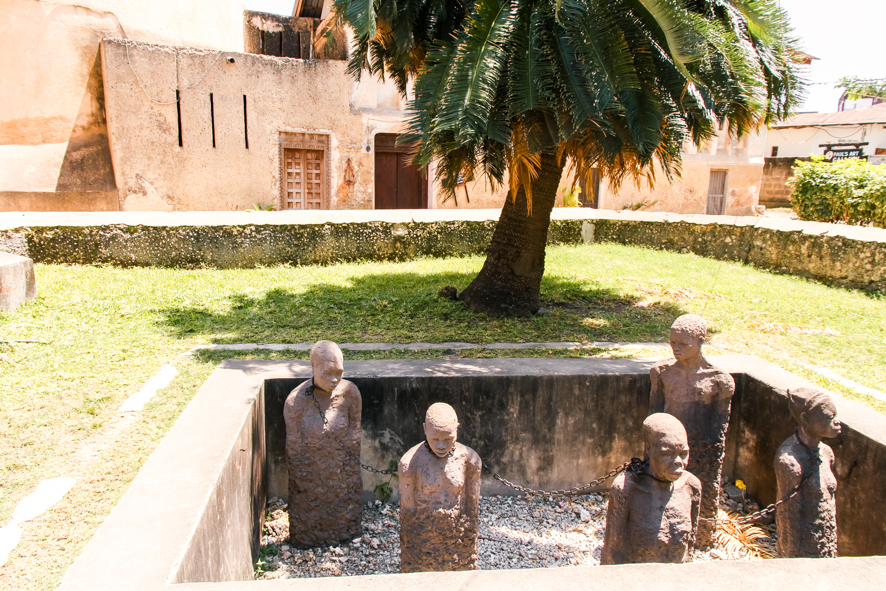
Historical monuments
There are a couple of monuments in Stone Town. The old fort (it reminded us a lot about Galle in Sri Lanka), several houses from rich merchants, and the House of Wonders (you can only see the outside since part of it collapsed) are definitely worth a visit as they hold an important place in Zanzibar’s history.
Don’t’ forget to pass in front of Freddie Mercury’s house as well. Yes, he was born as Farrokh Bulsara in Zanzibar.
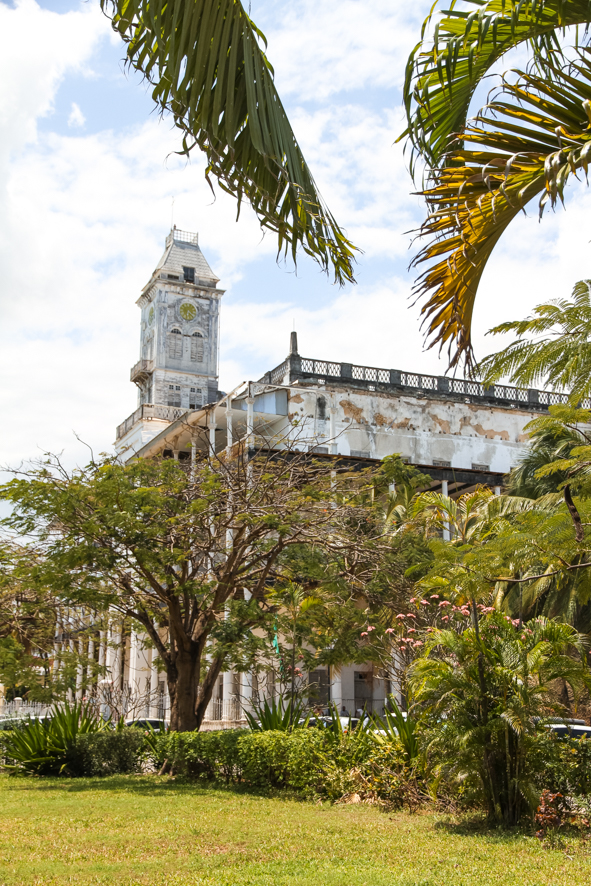
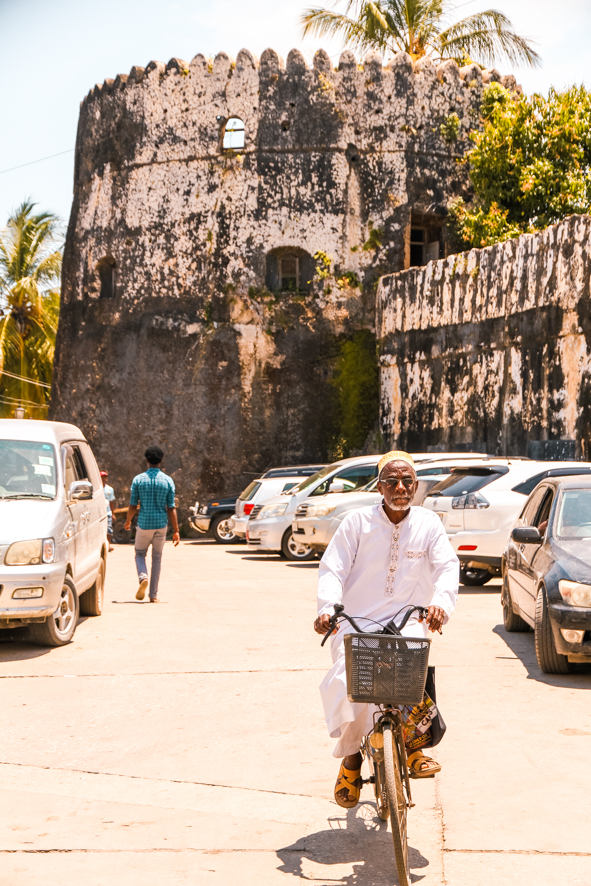
Bonus: Jaws corner
Jaws corner is a very interesting place at the intersection of several streets. It is a small square where early in the morning, locals discuss political matters unofficially around a cup of black Zanzibar coffee. You can also use the public phone to make free international phone calls.
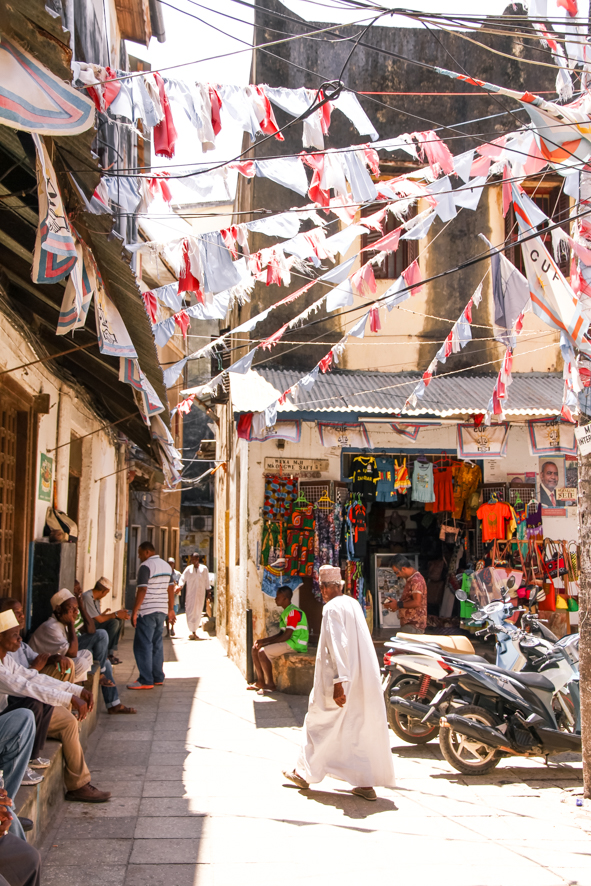
2. Delight your senses with a Spice Tour
After visiting Stone Town, head on a spice tour. Why? Zanzibar is also known as the Spice Island and is famous worldwide for its cloves and many other spices.
Tip: if you’re in a rush, it is possible to combine the Stone Town visit with the spice tour in a day with Eco & Culture Tour. More information here.
You’ll get a guide for the visit that will show you a bunch of spices that you use when you cook at home as well as some you never heard of. They will give you crushed leaves and ask you what you think the plant is. It’s really fun and a real journey for the senses. Have you seen what black pepper looks like on the vine, cinnamon before you put it in your favourite dish, and of course the famous cloves?
The tour also includes drinking coco juice out of a coconut and a quick fruit testing at the end.
3. Relax at Emerson Spice
After all those adventures, you’ll definitely need a rest. And if you’re looking for the perfect place, check out Emerson Spice. It’s made up of three adjoining World Heritage site buildings in the exotic Kasbah of Zanzibar’s Stone Town.
The main building is an old merchant’s house turned boutique hotel with 11 beautifully restored rooms with a unique style. We stayed in the room called Violetta after the lead character in Verdi’s opera “La Traviata”. The room displays shades of violet and blue under the gorgeous light coming through the huge windows. And there is a huge balcony that goes around the entire room!
The hotel focuses on reducing its impact on the environment and helping the community: they use rainwater, provide locally made soap to reduce the use of plastic, as well as towels made by local shops…
4. Admire the sunset on a Dhow
If you’re looking for an original way to admire the sunset in Stone Town, hop on a sunset Dhow cruise with Eco & Culture Tours.. It is short but is a great opportunity to end the day with beautiful views and take great photos.
5. Discover the island by car
If you have a few days on the island and want to do more than working on your tan (no judgment, we’ve all been there :P), why not rent a car. It is pretty straightforward. All you need is to hold an international driver’s license and organise your local one. Your rental company usually takes care of everything. We used Kibabu Cars and everything went very smoothly.
That way, you’ll be able to discover the many beaches around the island and check out the women gathering seaweed on the coast.
And driving in Zanzibar is very easy, especially outside of Zanzibar City. Everything is located at 2h max from Zanzibar city. It’s nothing like Bali or Vietnam.
6. Take it easy at the beach
Wherever you go on Zanzibar, you’ll never be far from the beach. And they are magnificent. There are a few places in the world where the water is so transparent and the sand so clear. The gradients of turquoise are simply mindblowing. Plus depending on where you are on the island, you’ll either be able to see the sunrise or the sunset.
The most famous and beautiful beaches are Matemwe (facing Pemba island), Kendwa (more touristy), Pongwe et Jambiani.
7. Eat great food with stunning views
If you love your food like we do, head down to Emerson Spice. The rooftop restaurant is one of the best restaurant in Stone Town and offers great city views for sunset. No surprise that you need to book in advance to secure a table for either the sundowner of dinner.
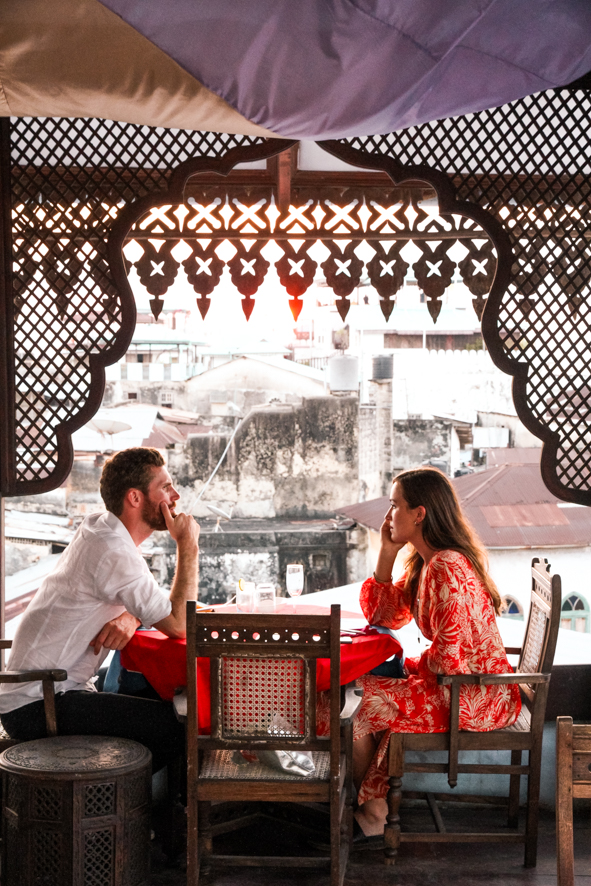
If you’re on the east coast, north of Paje, you can’t miss lunch at Upendo. It’s located right in front of the rock restaurant.
What if you have more time?
If you have time on the island and are still in need of inspiration, here are a few ideas:
- go on a snorkelling tour around Pemba Island
- visit Prison Island and its giant tortoises
- look for the endangered Red Colobus monkeys at the Jozani Forest
- grab a Zanzibar pizza at the Forodhani Gardens night market on the water’s edge of Stone Town
- visit the Zanzibar butterfly center
- visit the Old Hamamni Persian Baths
Many thanks to Destination Zanzibar, the Emerson Spice’s team and the Eco & Culture tours for hosting us and making our trip so perfect. As usual all opinions are ours.
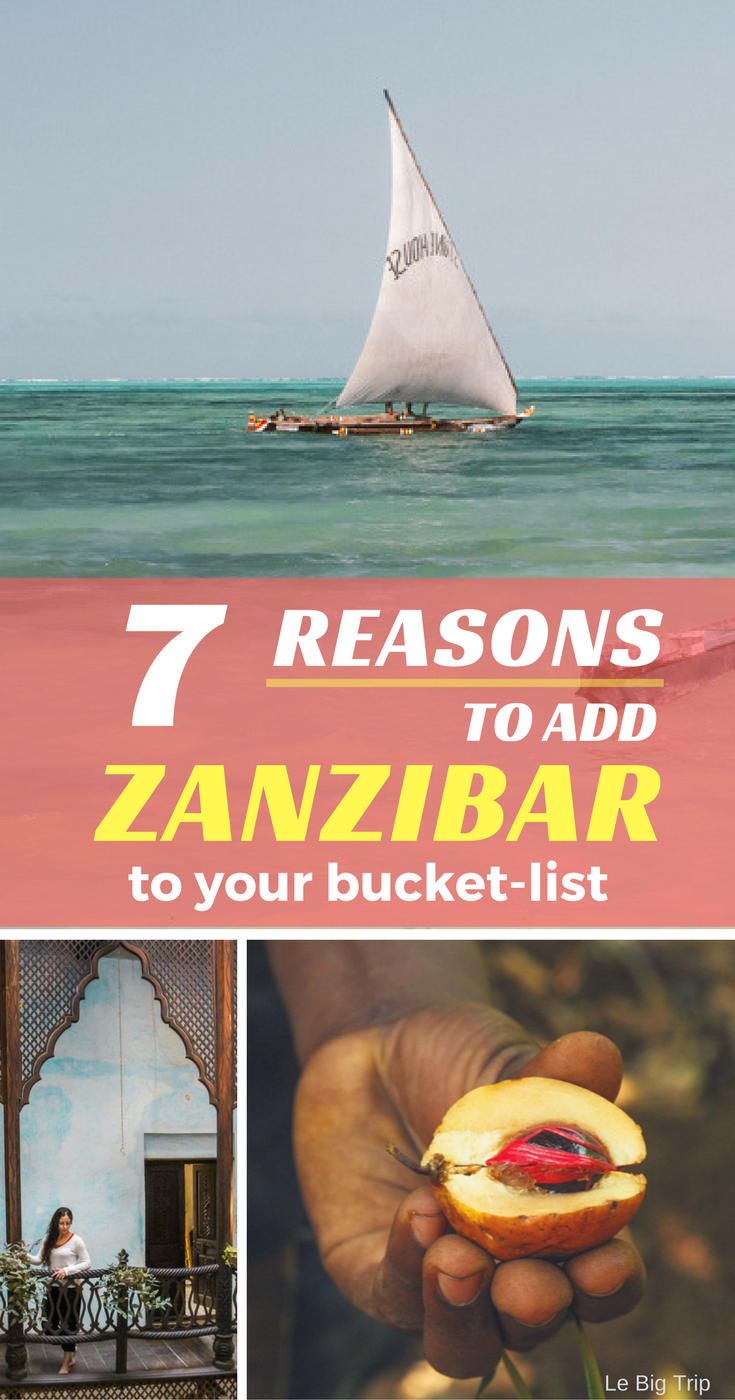
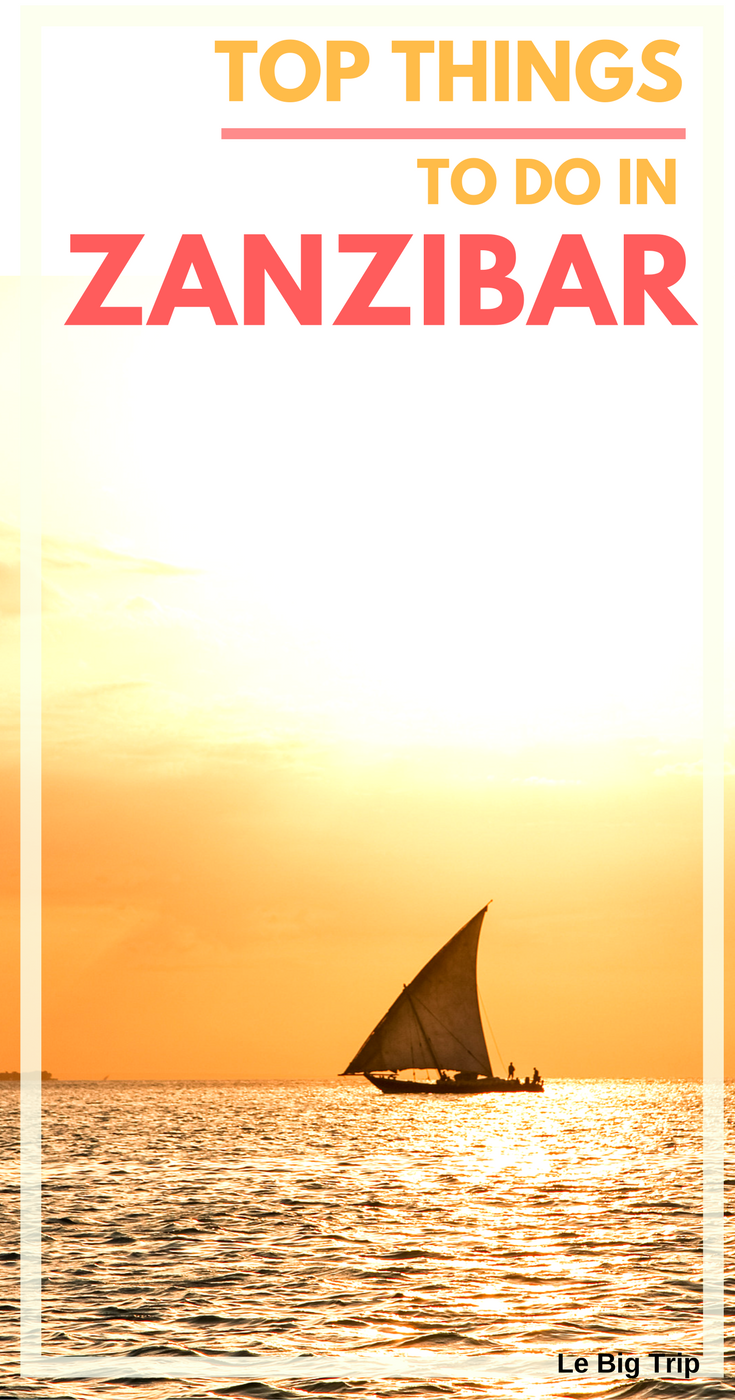


![[:fr]noix de muscade de Zanzibar[:en]Zanzibar Spice Tour - nutmeg[:]](https://lebigtriptravel.com/wp-content/uploads/2017/09/nutmeg-zanzibar-spice-tour-150x150.jpg)
![[:fr]Noix de coco Zanzibar[:en]Coconut Zanzibar[:]](https://lebigtriptravel.com/wp-content/uploads/2017/09/coconut-zanzibar-150x150.jpg)
![[:fr]Clou de girofle de Zanzibar[:en]Cloves from Zanzibar[:]](https://lebigtriptravel.com/wp-content/uploads/2017/09/cloves-zanzibar-150x150.jpg)
![[:fr]Tour epices Zanzibar[:en]Spice Tour Zanzibar[:]](https://lebigtriptravel.com/wp-content/uploads/2017/09/spice-tour-zanzibar-150x150.jpg)
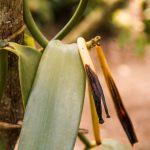
![[:fr]Arbre Achiote - Zanzibar[:en]Achiote Tree Fruit - Zanzibar[:]](https://lebigtriptravel.com/wp-content/uploads/2017/09/achiote-tree-fruit-spice-zanzibar-150x150.jpg)
![[:fr]Fruit Bixa Orellana - Spice Tour[:en]Bixa Orellana fruit - red dye[:]](https://lebigtriptravel.com/wp-content/uploads/2017/09/bixa-orellana-fruit-150x150.jpg)
![[:fr]Emerson Spice - book rooms[:en]Emerson Spice best room[:]](https://lebigtriptravel.com/wp-content/uploads/2017/09/emerson-spice-violetta-150x150.jpg)
![[:fr]Emerson Spice - best hotel Stone Town[:en]Emerson Spice - Hotel Zanzibar[:]](https://lebigtriptravel.com/wp-content/uploads/2017/09/emerson-spice-zanzibar-hotel-150x150.jpg)
![[:fr]Chambres Emerson Spice[:en]Emerson Spice rooms[:]](https://lebigtriptravel.com/wp-content/uploads/2017/09/emerson-spice-stone-town-150x150.jpg)
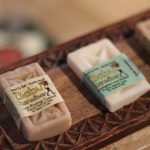
![[:fr]Emerson Spice - meilleur hotel Stone Town[:en]Emerson Spice - best hotel Stone Town[:]](https://lebigtriptravel.com/wp-content/uploads/2017/09/emerson-spice-best-hotel-150x150.jpg)
![[:fr]Emerson Spice - court[:en]Emerson Spice - courtyard[:]](https://lebigtriptravel.com/wp-content/uploads/2017/09/emerson-spice-courtyard-150x150.jpg)
![[:fr]Plus bel hotel Emerson Spice[:en]Most beautiful hotel Emerson Spice[:]](https://lebigtriptravel.com/wp-content/uploads/2017/09/emerson-spice-rooms-150x150.jpg)
![[:fr]tour de bateau a Zanzibar[:en]boat tour Zanzibar[:]](https://lebigtriptravel.com/wp-content/uploads/2017/09/zanzibar-boat-tour-150x150.jpg)
![[:fr]Meilleur coucher de soleil de Stone Town[:en]Bets sunset in Stone Town[:]](https://lebigtriptravel.com/wp-content/uploads/2017/09/zanzibar-sunset-150x150.jpg)
![[:fr]Les bateaux de Stone Town[:en]Stone Town boats[:]](https://lebigtriptravel.com/wp-content/uploads/2017/09/stone-town-boat-150x150.jpg)
![[:fr]Coucher de soleil sur un Dhow a Stone Town[:en]Sunset on a Dhow in Stone Town[:]](https://lebigtriptravel.com/wp-content/uploads/2017/09/stone-town-dhow-sunset-150x150.jpg)
![[:fr]Coucher de Soleil a Zanzibar[:en]Sunset in Zanzibar[:]](https://lebigtriptravel.com/wp-content/uploads/2017/09/sunset-stone-town-150x150.jpg)
![[:fr]Les plus belles plages de Zanzibar[:en]Zanzibar best beaches[:]](https://lebigtriptravel.com/wp-content/uploads/2017/09/tanzania-beach-150x150.jpg)
![[:fr]Coucher de Soleil a Zanzibar[:en]Sunset in Zanzibar[:]](https://lebigtriptravel.com/wp-content/uploads/2017/09/zanzibar-sunset-1-150x150.jpg)
![[:fr]Les plages de Zanzibar[:en]Zanzibar beaches[:]](https://lebigtriptravel.com/wp-content/uploads/2017/09/beach-zanzibar-150x150.jpg)
![[:fr]Palmiers a Zanzibar, Tanzanie[:en]Palm trees in Zanzibar, Tanzania[:]](https://lebigtriptravel.com/wp-content/uploads/2017/09/palm-tree-zanzibar-tanzania-150x150.jpg)
![[:fr]Crystal blue waters of Zanzibar[:en]Cristal blue waters of Zanzibar[:]](https://lebigtriptravel.com/wp-content/uploads/2017/09/zanzibar-beach-blue-150x150.jpg)